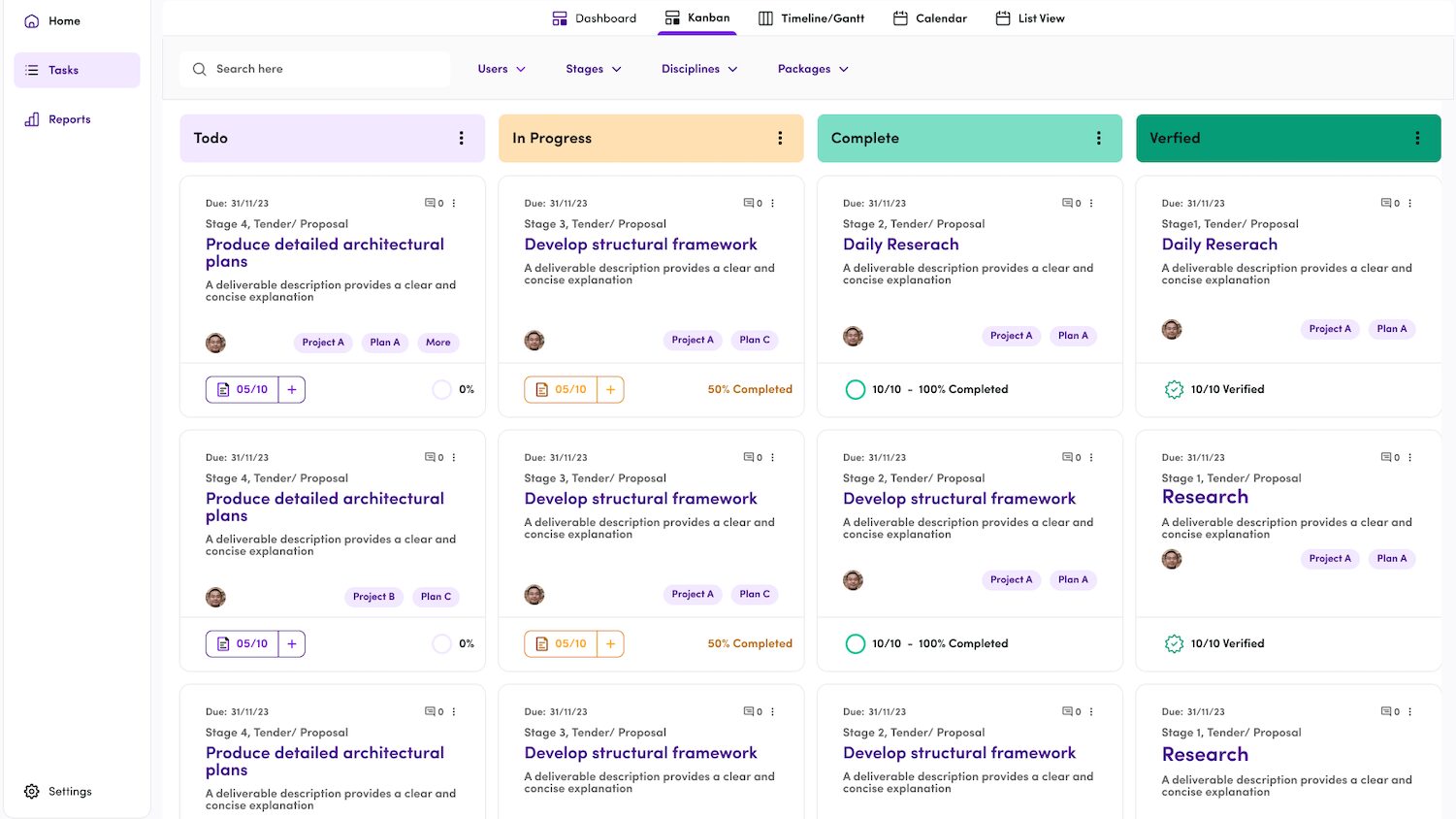The Digital Construction Awards attracted 170-plus entries this year, 85 of which have been shortlisted. Here, we detail the finalists for a category new for 2025, Information Management Best Practice.
This category recognises the benefits of best practice in information management, whether in the construction of a new built asset, in the management of an existing built asset, or within an organisation. Five entries made the shortlist.
Information Management Framework | AtkinsRéalis
To address the challenge of applying information management at scale, AtkinsRéalis took its 19650-based Information Management Framework (IMF) process and mapped it onto its existing project delivery processes. This identified the iterative nature of some of the elements of 19650 between the procurement and mobilisation phases.
AtkinsRéalis created a set of structured ‘step-throughs’ on its online portal, the IMF Implementation Tool, to take users through the mapped project delivery process with simple one-line questions and prompts for consideration.
The portal provides links to AtkinsRéalis’s IMF Implementation Library, which is where it stores BIM planning and implementation templates, as well as links back to its IMF principles and guidance. The portal supports those undertaking the project information management function to ensure that the scope of services, responsibility allocation, security assessment and project risks are consistently surfaced at the right time.
It also challenges project teams to consider all the digital value-add services that AtkinsRéalis offers. The online portal also acts as a repository for security-controlled evidence that can validate that the process has been followed, giving the business better assurance that projects are working to its BSI kitemark.
The IMF Implementation Tool structure significantly deconstructed the ISO 19650 process, with the intention of if being helpful, but this resulted in a daunting scale of activities to be carried out, which affected user uptake. As a result, AtkinsRéalis workshopped with users to provide more pragmatic task lists, reducing the number of activities by 60%, while maintaining the same high level of quality.
Recognising that much of its work comes through frameworks, AtkinsRéalis also developed a framework IMF tool structure with amendments that include:
- a comprehensive framework bid and mobilisation stage templates that support the bidding process and enable teams to deliver the packages through a standard operating model; and
- package templates with a streamlined set of mobilisation and standard delivery tasks to enable more teams to record their delivery to ISO 19650, even in reduced formats.
Ministry of Justice Small Secure Houseblock Programme | Mace Consult

The Ministry of Justice (MoJ) faced a formidable information management challenge on its Small Secure Houseblock Programme, comprising more than 200 live projects and involving more than 1,000 stakeholders. The programme required timely validation of project information aligned with stringent UK BIM Framework and ISO 19650 standards – but lacked the digital infrastructure to manage this at scale.
Mace led a transformative solution using Morta.io, automating validation of more than 13,000 information items across eight prison sites and three tier one contractors. The system integrated familiar tools such as Excel with cloud platforms including Power BI, Viewpoint, and Solibri, ensuring seamless IFC and Open BIM compliance. Bespoke templates and dashboards tracked contractor performance, reducing file validation time from 20 minutes to under a minute.
The results were impressive: a 99% reduction in information review time, 15% projected cost savings, and a 25% increase in compliance with MoJ documentation requirements. Error rates dropped from 60% to 35%, while automation ensured sustainability deliverables like BREEAM reports and TM54 assessments met environmental targets.
More than 200 stakeholders were onboarded through targeted training and cultural change efforts. Mace’s structured, scalable digital solution now underpins the MoJ’s modular delivery strategy, delivering compliance, clarity and long-term digital resilience across the justice estate.
Pioneering Practical Information Management | XD House

Having been involved in delivering large projects in the Middle East, SME consultancy XD House opened an office in the UK. It realised that working with high-profile clients in the UK required compliance and expertise and that it needed to demonstrate secure and efficient information management.
Thus, XD House pursued the BSI Kitemark for ISO 19650. With little industry guidance on Part 5, XD House consulted the BSI, the UK BIM Framework and information management leaders.
Using the Morta platform, it developed a dynamic, automated framework that aligned with ISO 19650 Parts 2 and 5, embedding compliance into everyday workflows. XD House developed a practical workflow for every clause of 19650-2, complete with video instructions to onboard newcomers or to share with industry peers. As an appointed party, this covered clauses 5.3 tender response to 5.7 model delivery.
The appointed party is required to produce Task Information Delivery Plans (TIDPs). By automating TIDP tracking through Morta (by connecting the planned vs actual data to the model submissions in the CDE), XD House eliminated manual errors and inefficiencies, allowing teams to manage deliverables seamlessly.
Project-specific capability and capacity assessments were also developed in Morta to allow for a quick tender response turnaround and ensured that the right expertise was in place for every project, while real-time progress reporting provides instant visibility into planned vs actual performance. Most importantly, XD House implemented secure information-sharing workflows that aligned with ISO 19650-5, protecting sensitive project data while enabling effective collaboration.
By automating TIDP tracking and implementing real-time progress reporting, XD House has reduced manual processes by 20-30%, freeing up valuable resources to focus on collaboration and innovation.
XD House secured the BSI Kitemark in September 2024.
Smart Motorways Programme Alliance | Fluor/Jacobs/WSP/Costain/Balfour Beatty/BAM Nuttall-Morgan Sindall JV/National Highways

The Smart Motorways Programme Alliance operates on Project 13 principles and comprises: the client National Highways; Fluor, responsible for production management; Jacobs and WSP handling digitally-enabled design; and Balfour Beatty, Costain and the BAM Nuttall-Morgan Sindall JV as onsite assembly partners. Collectively, they work with more than 100 suppliers, ranging from SMEs to global players.
Their challenges included:
- facilitating secure, collaborative sharing and information management;
- integrating the UK BIM Framework across the seven alliance partners and the many varied programmes;
- overcoming different legacy systems/corporate policies and levels of digital maturity;
- fostering a culture of unprecedented integrated collaboration, communication and transparency that promotes data-led insights and decision-making for greater productivity/efficiencies, along with enhanced quality and unified governance; and
- encouraging innovation and programmatic approaches for successful delivery while driving safer, more efficient, greener solutions that simultaneously maximise road user benefits.
These challenges were addressed by digital engineering and information management specialists drawn from the alliance partners, operating as one team.
They developed the Alliance Information Management System, a business management platform where processes are centrally referenced, including a common coding standard for documents, geometrical and alphanumerical data.
Effective communication was key, achieved through an information execution plan and a technology stack, which guided the implementation of current and new technology while ensuring standards compliance. The Alliance M365 Collaboration Environment underpins this strategy, providing a secure neutral/agnostic platform for information/data sharing.
As of January 2025, SMP Alliance had realised £97.43m assured efficiencies (with £144.14m forecast) on programmes totalling £1.2bn. Digital solutions helped reduce pre-construction times by up to 60%.
Transforming information delivery planning | Tilbury Douglas/Asite

Following a company-wide audit, Tilbury Douglas identified key areas for improvement: operational efficiencies, communication, supply chain management, digital security and sustainability. It also aimed to add value for clients through advanced digital information management.
Tilbury Douglas sought an intuitive tool to manage work packages, tasks, and deliverables across 400 projects internationally. With more than 1,000 suppliers and a £2bn construction value, it required an integrated management system (IMS) aligned with the UK BIM Framework and ISO 19650 standards. Finding no existing tool that met its stringent requirements, Tilbury Douglas partnered with Asite to develop a bespoke solution.
Following nine months of development, Tilbury Douglas now has an IMS that automates the tracking of information deliverables at both project and organisational levels. Previously managed on Excel spreadsheets, progress reporting is now automated, eliminating outdated reports and ensuring real-time accuracy. It extracts actionable reports from the CDE, displaying information plans scalable from project to organisation level.
The IMS empowers contributors to understand their tasks and gives project and information managers a data-driven view of deliverables. This fosters greater transparency and accountability across our projects. To ease adoption, familiar tools like Kanban boards and Gantt charts were incorporated, ensuring an easier transition for teams.
A total of 1,200 staff, contractors and supply chain partners have been trained on the IMS.
- 100% reduction in back-and-forth emails for document tracking, eliminating inefficiencies;
- 1,500 hours saved per project on paperwork and communication; and
- £75,000 cost savings per project.
The winners will be revealed at the gala dinner on 1 July at the Brewery in London.
The Digital Construction Awards are organised by Digital Construction Week, Construction Management and the Chartered Institute of Building. The first sponsor to be announced is Bluebeam.
Generative artificial intelligence was used to help with the creation of this article. All content in the article was sourced, checked and verified by our editorial team before publication.
View the original article and our Inspiration here


Leave a Reply